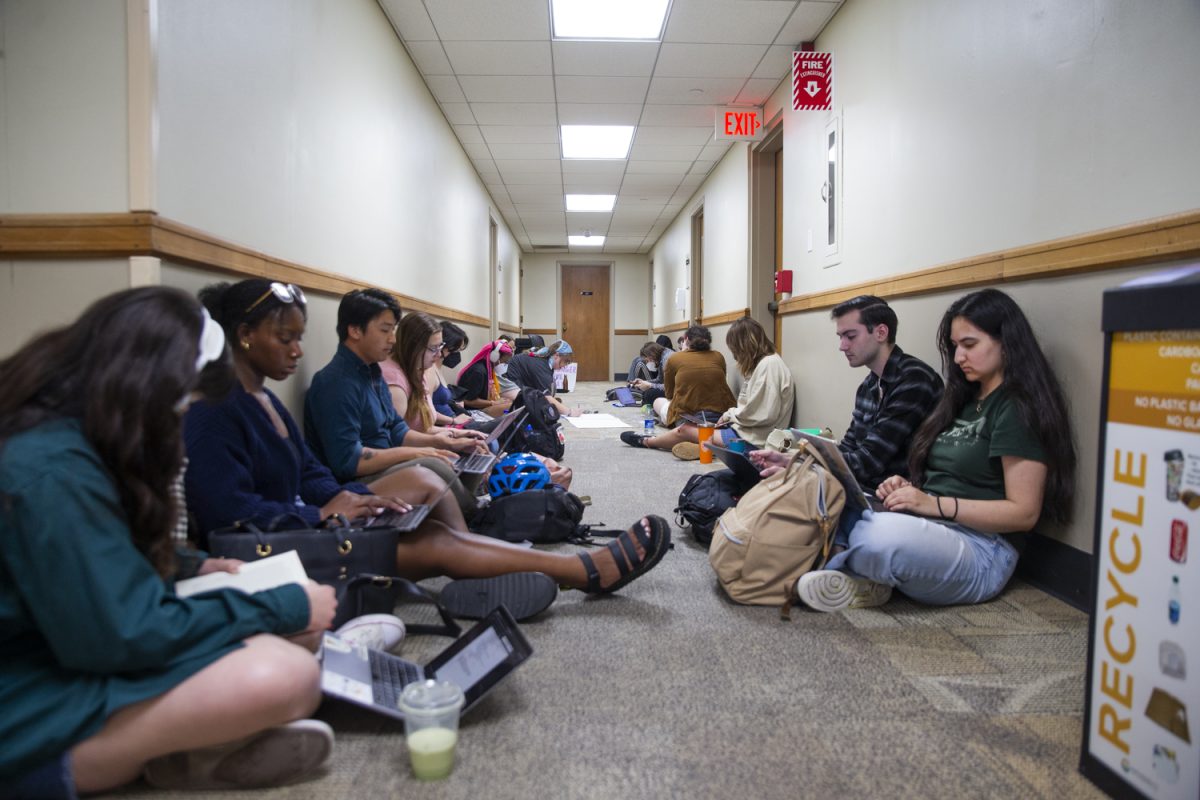University of Iowa students filtered through the hallways on the second floor of the Iowa Memorial Union Wednesday for a sit-in following the university’s decision to dissolve the Rape Victim Advocacy Program and transition it to the Domestic Violence Intervention Program.
The several dozen students who participated in the sit-in called for the program to be reinstated. RVAP employee Olivia Brown gave a written statement to The Daily Iowan during the sit-in.
“The University of Iowa is making it clear that they do not stand with victims of sexual assault,” the statement read. “Amid the school’s constant crisis of sexual assaults on campus, they shut down a service that hundreds use: students and surrounding communities.”
In an April 4 press release, the UI announced its decision to transition RVAP services to the Domestic Violence Intervention Program by Sept. 30. The release states that this decision was made in an effort to streamline services for victim-survivors by consolidating to a single point of access for the region.
Dominic Jiacinto, a UI fourth-year student and attendee at the sit-in, said RVAP is a resource that serves not only students at the UI, but also people outside of Johnson County. RVAP and DVIP serve the same region of eight counties in southeast Iowa, including Cedar, Des Moines, Henry, Iowa, Johnson, Lee, Washington, and Van Buren.
“If other counties are relying on RVAP support rather than just us [UI students] that means they need the support. The policy change is just ridiculous,” Jiacinto said.
Jiacinto said this issue personally affects him and that he will not have an advocate anymore.
“I am a victim. It happened during my freshman year and if that hadn’t happened, I would be graduating in a week or so,” Jiacinto said.
The UI’s most recent Speak Out Iowa Survey in 2021 revealed that 16.6 percent of female students, 5.1 percent of male students, and 22.6 percent of transgender or gender non-conforming students have experienced a rape or an attempted rape.
UI President Barbara Wilson said Tuesday that the university always has to evaluate its resources, space, and the activities the UI engages in relative to the stakeholders it serves.
“We’re not going to get rid of the services, but it may be that it’ll be better in this larger, different organization that really is beyond the campus. I think it’ll be seamless. I hope it’ll be seamless,” Wilson said. “I think people have been very nervous about it, but our goal is to keep serving rape victims, survivors, and anybody who needs the help and doing it in a way that’s the most effective.”
Jiacinto said having a personal rape victim advocate, which is one of the resources RVAP provides, has been a useful resource.
“I get the vibe from a lot of people on campus that they don’t know much about RVAP or care to do anything about anything beyond taking the university at their word,” Jiacinto said.
Rose Bilicki, a UI first-year student and attendee at the sit-in, expressed similar concerns.
“I think it is appalling that the university decides to close RVAP in the way they did by completely ignoring the victims’ needs,” Bilicki said. “There are very few staff members to go around, meaning they will have to go through a flooded hiring process which would directly impact victims who do not have access to services anymore.”
RELATED: University of Iowa officials on the ‘difficult step’ of RVAP transition
T Natvig, a UI first-year student and attendee at the sit-in, said many of their friends were employed at RVAP and were not consulted in the dissolution of the service.
“A lot of my friends have gone through sexual assault and rape, and it is not an easy thing to deal with,” Natvig said. “I feel like that is why RVAP is a necessary resource on campus.”
Natvig said having a specific sexual response team is necessary as a part of the university.
DVIP will add 10-15 new positions to accommodate RVAP services and the title and crisis line will be maintained for the next 18-24 months.
The release states that current RVAP services will continue uninterrupted, but the transition will lay off 12 UI staff members.
“I know that the program is transitioning to DVIP, but they probably cannot handle all the students that are going to come in,” Natvig said.



